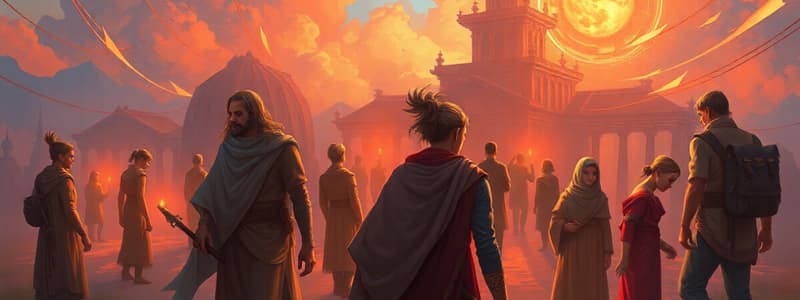Podcast
Questions and Answers
What defines the nature of a community?
What defines the nature of a community?
- The interactions and behaviors among its members (correct)
- Its legal formalities and structures
- The physical space it occupies
- The economic activities conducted within it
Which statement best describes an informal power structure within a community?
Which statement best describes an informal power structure within a community?
- It is characterized by formal rules and regulations.
- It is solely based on government appointments.
- It is comprised of individuals who lead through recognized leadership capabilities. (correct)
- It lacks any form of authority or leadership.
A formal community is primarily distinguished by which characteristic?
A formal community is primarily distinguished by which characteristic?
- Open membership for all individuals
- The presence of informal gatherings
- Institutional hierarchies that define relationships (correct)
- A lack of structured hierarchies
What characteristic is defining of a rural community?
What characteristic is defining of a rural community?
How does a global community primarily differ from a local community?
How does a global community primarily differ from a local community?
In the context of community dynamics, what is meant by 'social space'?
In the context of community dynamics, what is meant by 'social space'?
What is a key characteristic of an urban community?
What is a key characteristic of an urban community?
Which of the following best describes the term 'community boundaries'?
Which of the following best describes the term 'community boundaries'?
What characterizes a rural community?
What characterizes a rural community?
Which perspective views community as a congregation unified by one common characteristic?
Which perspective views community as a congregation unified by one common characteristic?
What is the definition of social capital in a community context?
What is the definition of social capital in a community context?
In which type of community do houses typically have yards and are close to cities?
In which type of community do houses typically have yards and are close to cities?
Which of the following best describes the civil society perspective of community?
Which of the following best describes the civil society perspective of community?
What role does a leader play in a community?
What role does a leader play in a community?
What is self-organization in the context of community dynamics?
What is self-organization in the context of community dynamics?
Which of the following is a characteristic of slum communities?
Which of the following is a characteristic of slum communities?
Study Notes
Sociology and Community
- Community is a group adhering to a social structure within society.
- Defined by common interests, social systems, ecology, and locality.
Types of Community
- Urban: High population density, limited green spaces.
- Rural: Fewer inhabitants, abundant natural areas.
- Suburban: Near cities with neighborhoods featuring gardens.
- Slums: Overpopulated areas with poor living conditions.
Perspectives of Community
- Social Science Perspective: Emphasizes shared characteristics uniting people.
- Community-Based Perspective: Focuses on community as an intervention setting.
- Ecological Perspective: Examines individual behaviors within social contexts.
- Sectoral Perspective: Views community as a system of individuals and sectors.
- Civil Society Perspective: Includes NGOs and volunteer groups addressing social issues.
Key Concepts
- Social Capital: Networks facilitating community function and relationships.
- Communitarianism: Explores individual-community connections.
Self-Organization and Volunteerism
- Self-organization occurs spontaneously with enough energy; no external control needed.
- Volunteerism involves active participation in groups for community benefit.
Community Structure
- Encompasses natural environments and human-created institutions.
- Community Power: Communities' ability to control resources and activities.
- Leader: Responsible for guiding a group.
- Leadership: Quality and process of decision-making for community welfare.
Social Change and Community Dynamics
- Social change refers to alterations in societal order.
- Dynamics are shaped by community structure and reactions to internal/external forces.
Nature of Community
- Construct characterized by meaningful interactions and expectations among members.
- Fuzzy boundaries allow for overlapping identities and interactions.
Community Mobility
- Communities can shift or evolve, especially with technological advances.
Power Dynamics
- Formal Power Structure: Authority derived from governmental rules.
- Informal Power Structure: Authority based on leadership capabilities.
- Legal Authoritative Decision-Makers: Individuals with formal ruling authority.
Individual Dimensions
- Relationships based on kinship, social networks, and institutional involvement.
- Formal Community: Hierarchical structures defining authority relations.
- Global Community: Interaction across distances and time.
- Informal Community: Operates through socio-cultural mechanisms.
- Local Community: Defined by physical proximity and shared conditions.
- Rural Community: Focused on agriculture, often near urban fringes.
- Typology: Classifies various community types based on characteristics.
- Urban Community: Centers of industrial and commercial activity with high density.
Social and Physical Space
- Social Space: Physical or virtual areas frequented by community members.
- Physical Space: Unlimited three-dimensional areas shaped by community dynamics.
Studying That Suits You
Use AI to generate personalized quizzes and flashcards to suit your learning preferences.
Description
Explore the concepts of community within sociology, archaeology, and anthropology. This quiz covers the characteristics of different types of communities, including urban areas, their social systems, and the significance of shared interests and local institutions. Test your knowledge on the dynamics of community interactions.




